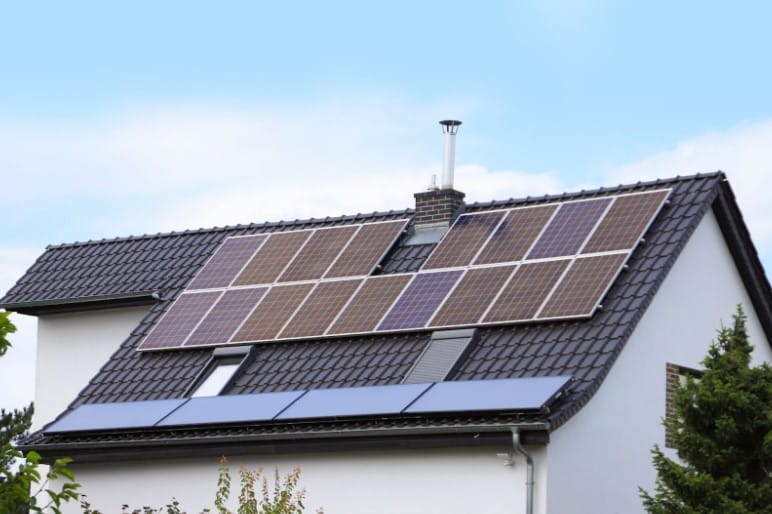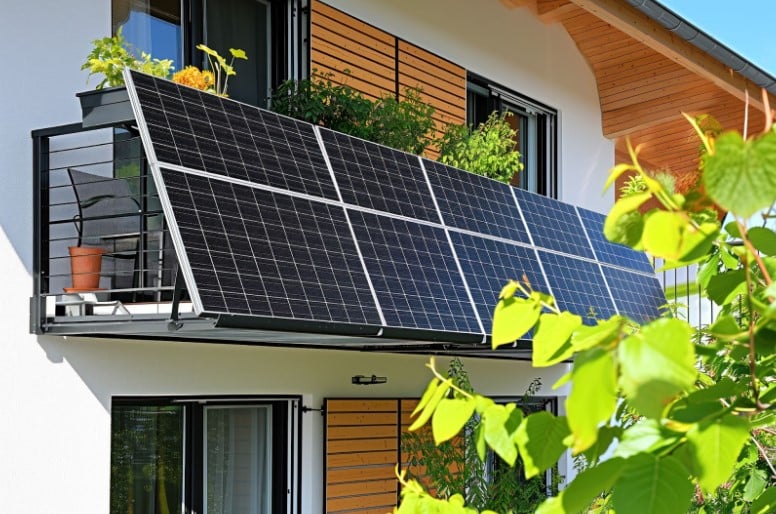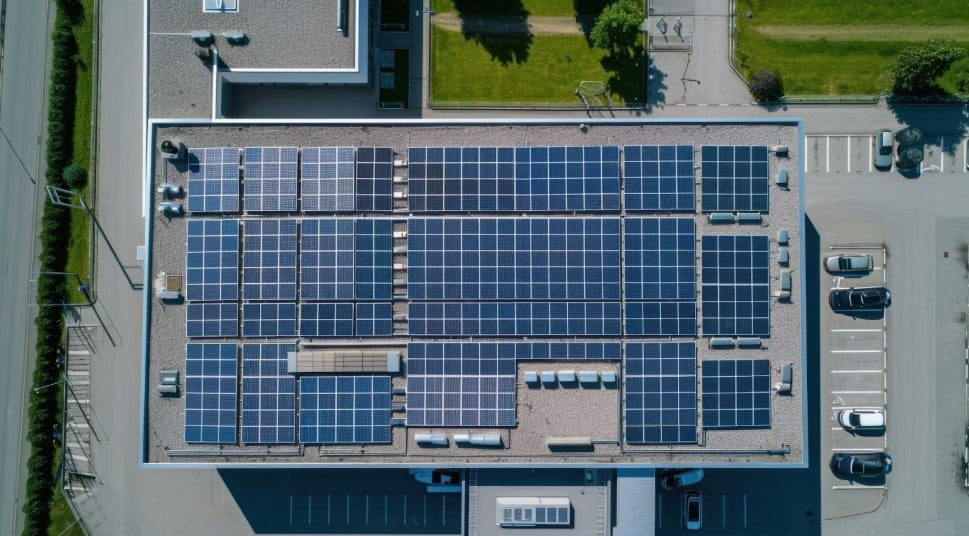Germany is a global pioneer in solar energy, setting the bar through innovative incentives and forward-thinking legislation that make harnessing the power of the sun more accessible than ever. This vibrant solar environment provides installers with a unique opportunity to help clients in maximising the benefits of cutting-edge solar technology. Dive in as we look at Germany’s current solar incentives and how they enable both residential and business end users to embrace a brighter, greener future!
Zero Value-Added Tax (VAT) Rate for Solar
One of the most significant innovations in Germany’s solar energy policies is the implementation of a 0% value-added tax rate for the supply and installation of solar panels, which went into effect on January 1, 2023. This regulation applies to a wide range of systems, including single-family residential and commercial photovoltaic (PV) installations rated up to up to 30 kilowatts (kW) in size. For multi-family homes, the exemption applies to systems up to 15 kW per residential or commercial unit, with a maximum of 100 kW per building.
This 0% VAT policy is a game changer, lowering the initial cost of solar installations and making them more affordable and accessible to both homeowners and businesses. For installers, this is an important point to relay with potential clients because lower costs can make solar energy projects more enticing and financially practical. By emphasising this incentive, you may not only assist clients save money, but also stimulate the adoption of renewable energy solutions, thereby contributing to a cleaner future.
What is a Value-Added Tax?
A value-added tax is a consumption tax applied to goods and services at each stage of production and distribution where value is added. Unlike a sales tax that is typically charged only at the final point of sale, VAT is collected incrementally throughout the supply chain. For example, manufacturers pay VAT on raw materials and retailers pay VAT on the finished goods, with each entity in the chain passing on the cost to the next. Ultimately, the end consumer bears the full cost of the tax, as businesses can usually reclaim VAT paid on their inputs. VAT is commonly used in many countries worldwide to generate government revenue efficiently.
In Germany, value-added tax applies to most goods and services with a standard rate of 19%. Reduced rates, such as 7% for items like food and books and 0% for solar systems, are also in place. Businesses typically file VAT returns monthly or quarterly, with payments due by the 10th of the following month, although smaller taxpayers may have reduced reporting requirements. VAT is an annual tax, requiring an annual return to reconcile with periodic filings. Special systems like the One-Stop-Shop (OSS) simplify VAT compliance for cross-border sales and services within the European Union. Recent legislation, effective from 2025, mandates electronic invoicing for business-to-business transactions in structured formats, with phased transitional periods to ease adoption.
Feed-in Tariffs and the Renewable Energy Sources Act (EEG)
Germany’s Renewable Energy Sources Act (EEG) remains a vital component of its solar incentives, but it has evolved dramatically over the years. Initially, the EEG provided high fixed feed-in rates for solar electricity, which fuelled a spike in solar adoption in the early 2000s.
Today, the system has shifted: larger systems now rely on competitive auctions rather than fixed tariffs, while smaller systems (up to 100 kW) continue to profit from feed-in tariffs, albeit at lower rates than in the 2000s. The Federal Network Agency (Bundesnetzagentur) manages this program, modifying tariffs for smaller systems monthly based on installation activity. This guarantees that incentives are consistent with the lowering prices of solar technologies and market efficiency.
Germany’s Bundestag has approved a law to eliminate the Renewable Energy Sources Act (EEG) levy starting July 1, 2022, six months earlier than planned. This measure, which marked a major modification to the EEG, aims to alleviate rising energy costs, saving a typical family of four around €300 annually compared to 2021. Electricity providers are legally obligated to fully pass on this cost reduction to consumers.
The EEG levy, introduced in 2000 to fund renewable energy expansion, will permanently end in January 2023. To offset the revenue loss, the government will use approximately €6.6 billion annually from the Energy and Climate Fund (EKF) to continue subsidizing renewable energy projects.
Electricity prices in Germany are composed of various factors, including supply and distribution costs, grid fees, and state-imposed charges such as VAT, electricity tax, and concession fees.
Although tariffs are lower than in the past, they continue to provide significant support for smaller solar systems, making solar energy a viable investment option for many. These revisions demonstrate Germany’s commitment to renewable energy while also responding to changing technology and market situations.

Federal Funding for Efficient Buildings (BEG) for Solar
The Federal Funding for Efficient Buildings (BEG) initiative in Germany, which began on January 1, 2021, promotes energy efficiency and renewable energy upgrades in buildings. It addresses a variety of technologies, including solar energy systems, energy-efficient heating and air conditioning technology, heat pumps and other technology.
The program is divided into three categories: BEG WG for residential structures, BEG NWG for non-residential buildings and BEG EM for individual measures. Individual measures refers to a variety of renovations to existing buildings that focus on specific energy improvements to the property.
BEG EM offers loans and subsidies for solar thermal systems, with funding rates ranging from 20% to 40% of the eligible expenses. Applicants can simplify the procedure by merging various measures into a single application. In 2020, BEG’s predecessor program funded slightly under 500,000 residential units, totalling approximately €27 billion in loans and grants.
2024 Updates to the BEG Program
Recent updates to Germany’s Federal Funding for Efficient Buildings (BEG) program focus on expanding subsidies for energy-efficient refurbishments, including heating system replacements and insulation. Residential building upgrades now qualify for subsidies covering up to 70% of costs, while non-residential projects are eligible for subsidized loans and other financial incentives.
New guidelines introduce bonuses, such as a 5% efficiency boost for advanced heat pumps and a 20% “climate speed bonus” for early transitions to renewable heating systems. An individualized renovation roadmap (iSFP) can increase funding for certain projects, raising the maximum subsidy per residential unit to €90,000. For non-residential buildings, funding limits are now tied to building size, offering up to €400 per square meter for heat generators.
Additionally, supplementary loans of up to €120,000 are available for households earning less than €90,000 annually, with applications open starting February 27, 2024. Importantly, these funds can be accessed retroactively for projects completed before submission. The changes aim to streamline the transition to energy-efficient buildings while providing enhanced financial support for homeowners and businesses.
SolarPLUS: Berlin’s Solar Funding
The SolarPLUS program is a government-funded initiative in the State of Berlin designed to encourage the adoption of solar energy by providing financial incentives for photovoltaic (PV) systems and energy storage. Available to individuals, businesses and organizations, the program offers funding based on the size and type of the system installed.
Key benefits include a 20-year feed-in tariff of €0.095 per kWh for generated electricity, one-time grants of €1,500 for systems up to 3 kW and €2,000 for larger systems and interest-free loans for the first five years to help with installation costs. Additionally, subsidies are available for removing old, asbestos-containing roof tiles for systems installed on such roofs.
Eligibility requirements include installation on residential properties in Berlin, a minimum system size of 3 kW and work performed by certified installers. The program makes solar energy more accessible and is worth exploring for those planning solar projects in Berlin.
SolarPLUS makes solar installations more desirable in Berlin by complementing federal government subsidies, providing specialised solutions for a variety of demands and encouraging greater adoption of renewable energy.
Applications for Berlin’s SolarPlus program can be found online at Investitionsbank Berlin.

Berlin’s Balcony Power Plants Subsidy
Since February 2023, Berlin tenants can receive up to 500 euros in subsidies for balcony power plants as part of the SolarPlus program. These solar devices, which generate electricity on balconies, now have a subsidy limit of 800 watts, up from 600 watts. Tenants must have landlord permission, and no longer need to register with Stromnetz Berlin. If the system costs up to 500 euros, the subsidy covers the full amount; for more expensive systems, the buyer pays the difference. The changes aim to support Berlin’s climate goals, which include reaching 25% solar power in energy generation by 2035. By April 2024, over 7,700 grants had been approved, with the funding pool supporting up to 14,000 devices.
Recent Developments and Future Outlook
New Measures to Speed Up Solar Expansion
In April 2024, the German government announced additional initiatives to accelerate the adoption of solar energy. Significant improvements include raising subsidies for solar systems with more than 40 kilowatts of output by 1.5 cents per kilowatt-hour, simplifying rules for sharing solar electricity in apartment complexes and making tiny balcony solar systems easier to install.
Additionally, more area, including low-quality agriculture, has been set aside for solar parks and ground-mounted systems. These revisions demonstrate the government’s commitment to eliminating hurdles and promoting solar expansion. For installers, maintaining up to date on these changes is critical for properly advising clients and altering business plans to line with the changing market.
Balcony Solar Systems
Plug-and-play solar panels for balconies are becoming increasingly popular in Germany’s solar market. These modest devices, which cost roughly €200, are making it easier for households to generate their own energy. Recent regulatory improvements have made them easier to install, increasing their popularity. While small panels cannot replace bigger, professionally installed solar systems, they can provide an affordable and accessible method for consumers to get started with solar energy. Installers should be aware of this development and examine how these technologies may impact or complement their services.
Industry Perspectives and Challenges
While the future of solar energy in Germany appears promising, the industry faces several hurdles. One important issue is that German solar panel manufacturers struggle to compete with lower-cost imports, particularly from China. To solve this, there are ideas for “resilience bonuses” or special auctions that would provide higher feed-in tariffs for systems mostly manufactured in Europe.
As an installer, you must comprehend these industry trends. While they may not have an immediate influence on your everyday operations, they may affect the availability and price of solar panels and other components in the future. Staying informed allows you to plan ahead and adjust to potential changes.

Implications for Installers
Emphasizing Cost Savings
With a 0% VAT rate and different subsidies, installers should highlight the huge cost reductions that clients may make with solar energy. According to the Fraunhofer Institute for Solar Energy Systems (ISE), solar power is now the most cost-effective source of electricity in Germany, with some installations costing as little as 3.7 eurocents per kilowatt hour. When it comes to promoting solar installations, highlighting the savings and long-term economic benefits can be a powerful selling point.
Navigating Regulatory Complexity
Solar incentives in Germany can be complex and continuously changing. Installers must keep up with federal, state and municipal initiatives, as well as regulatory changes. This understanding allows you to properly guide clients and ensure they get the most out of the perks offered.
Adapting to Market Trends
The growing popularity of balcony solar systems, as well as the expansion of ground-mounted solar parks, create intriguing new options. Adapting your services to match the demands of these emerging markets may help your company grow.
Quality and Certification
Programs such as SolarPLUS require certified installers, thus it is critical to maintain high quality standards and acquire the relevant qualifications. This not only qualifies you for certain incentives, but it also increases trust and confidence among your clients.
Long-term Perspective
Current solar subsidies are enticing, but it’s crucial to consider the future. These benefits may be reduced in the future as solar technology gets more affordable. Installers should focus on developing a solid, adaptable business model that can thrive even if incentives are decreased.
Germany’s solar incentives provide excellent opportunities for solar installations, with perks like as zero VAT, feed-in tariffs and subsidies that make solar energy desirable to both homeowners and businesses. However, these incentives can be complex and ever-changing, necessitating installers’ knowledge and adaptability.
As an installer, you’re not just responsible for installing solar panels; you’re also a guide, assisting clients in understanding and taking full advantage of any incentives. By staying current on legislation updates, market trends and solar technology breakthroughs, you can position yourself as a reliable partner in Germany’s transition to renewable energy.
With the government’s strong commitment to increasing renewable energy, the future of solar in Germany seems positive. As an installer, you play an important role in this shift by delivering clean and cheap energy to households and businesses. By taking advantage of these advantages and remaining adaptable in a changing market, you may build a successful business while helping Germany’s sustainable energy ambitions.


